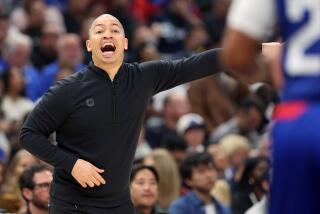Here’s One Clippers Can’t Afford to Lose
- Share via
You could give the Clippers a word processor with spell check and a calculator to check their math and they still wouldn’t get their homework right.
Even in the simplified contract world of today’s NBA, the Clippers still want to look for the fourth option out of three answers on a multiple-choice question.
They have a chance to re-sign the most consistent player on their roster, a guy who actually has been through the Clipper experience and doesn’t mind coming back for more. And yet they continue to send signals that they’re going to do things the hard way when it comes to re-signing Maurice Taylor.
Taylor’s agent, David Falk, is coming to town this week to negotiate a contract extension. The NBA salary cap says the most the Clippers can give Taylor is close to $71 million for six seasons.
And that’s what Taylor wants.
If the Clippers have any brains at all, that’s what they will offer him.
Get this over with, give the fans something to look forward to other than the completion of the Staples Center.
Don’t risk any misunderstanding. Just smile and sign on the dotted line.
Bad things happen when you mess with Falk. It has nothing to do with karma. It’s about cold, calculated revenge. He has a long memory and a long track record for winning.
Some people thought that the NBA’s new collective bargaining agreement with its restrictions on high-end salaries, coupled with the retirement of Falk’s signature client, Michael Jordan, would render him powerless.
But Falk is like a virus that can’t be eradicated, always mutating into a new strain that resists treatment. He flexed his muscles this season, brokering the trade that tore up the nucleus of the Minnesota Timberwolves and sent Stephon Marbury to the New Jersey Nets.
So now the Clippers want to take a stand on player salaries. And they want to risk the wrath of the toughest dog in the pound.
The Clippers should relax. The war is over and the owners won. So why keep fighting battles?
The league now has a maximum on salaries, and for that the Clippers can be relieved. Taylor averaged 13.5 points and 4.6 rebounds in his first two seasons. Those numbers aren’t too far below the 13.7 points and 7.1 rebounds Kevin Garnett averaged in his first two seasons, and Garnett turned that into a $126-million contract.
Under the old system, it wouldn’t be too farfetched to hear Taylor asking for a $100-million contract of his own. Now it can’t happen.
The only problem for ownership is that the maximum salary sometimes acts as a minimum. A team’s best player knows exactly how much he can get, so he uses that number as both a starting and ending point. The results are contracts worth more than $70 million each for guys like Ray Allen and Antoine Walker. Both are nice players, but neither is a superstar.
Taylor fits in that same category. He isn’t a franchise player, but the franchise really can’t afford to be without him.
Even though the Clippers might have some statistics in their favor, they don’t have history on their side.
This thing is starting to remind me of the negotiations disaster between the then-Washington Bullets and another Falk client, Juwan Howard.
Howard was the fifth overall pick in the 1994 draft, and he wanted a contract worth $24 million over six years, an average of $4 million a year.
The Bullets dragged out the negotiations, said things that Howard took personally, and ultimately gave him a contract worth $37 million over 12 years (an average of $3 million a year, with a salary that started at $1.3 million for his rookie season). Their one concession was an escape clause after the second season.
That second season happened to be an All-Star season for Howard, who also won the hearts of Washington fans for his work in the community. It also happened to be the season prior to the huge free-agent splurge of 1996, when a labor-friendly market drove up the value of everyone from superstars to journeymen.
And between the time Howard’s contract was signed and he reached his opt-out window, a change in the league’s collective bargaining agreement wiped out restricted free agency, which meant Howard could go anywhere and the Bullets would not have the right of first refusal.
And Falk wasn’t about to do the Bullets any favors. When Howard became a free agent he left for a $100- million contract with the Miami Heat, but a vengeful and unprecedented ruling from the commissioner’s office nullified the deal and sent Howard scurrying back to the Bullets, who were forced to cough up $105 million over seven seasons for his services.
Since we’re trying to make this point to the Clippers, we’ll do the math: Instead of paying Howard $24 million for the first six seasons of his career, the Bullets/Wizards are on the hook for $108 million for the first nine seasons of his career.
And it’s all because they tried to save a few bucks, and because they chose the wrong agent to battle.
One last little omen: I saw Falk sitting at a blackjack table in a Las Vegas casino this weekend. He was beating the house.
*
J.A. Adande can be reached at his e-mail address: j.a.adande@latimes.com
More to Read
Get our high school sports newsletter
Prep Rally is devoted to the SoCal high school sports experience, bringing you scores, stories and a behind-the-scenes look at what makes prep sports so popular.
You may occasionally receive promotional content from the Los Angeles Times.






